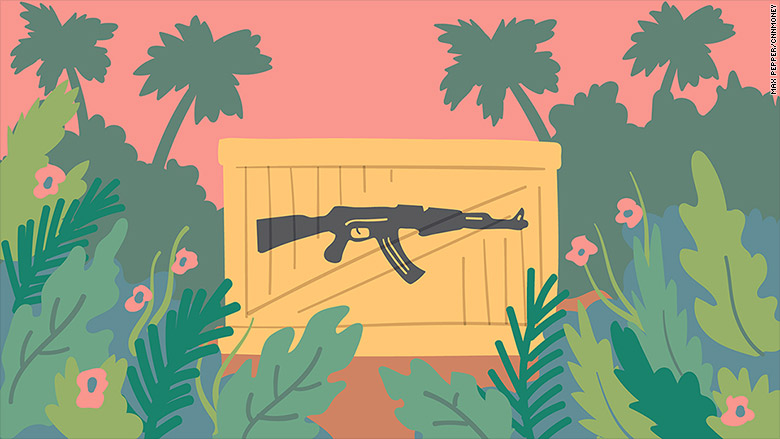
Two Romanian businessmen and an Italian politician got caught trying to sell rocket launchers and AK-47s to Colombian terrorists. But one now claims he was really just helping the CIA.
A wacky tale is playing out in a federal courtroom in New York City, where a Romanian security consultant is on trial for an illegal $17 million weapons deal.
In 2014, Virgil Flaviu Georgescu got caught in a federal sting operation. He was brokering a deal that involved selling machine guns and rocket launchers to the Communist guerrilla fighters of FARC, the Fuerzas Armadas Revolucionarias de Colombia.
The weapons would go to FARC soldiers who explicitly said they intended to kill American federal agents and shoot down the cocaine-crop-destroying helicopters flown by the U.S. Drug Enforcement Administration.
FARC's half-century-long jungle revolution is being paid for by its $1 billion annual cocaine business.
Except the weapons were never actually sold. The supposed FARC buyers were actually DEA informants.
But that's not Georgescu's defense at his criminal trial this week. He admitted in court that he helped broker the weapons deal, but claims that the entire time he was just taking part in the deal to give information to the CIA.
At the center of this strange case is Georgescu, a 43-year-old native Romanian who obtained American citizenship through marriage. Back in Romania, he was a security consultant who provided body guards and logistical advice.
Georgescu called the CIA tip line twice in early 2012 to warn the U.S. government that he was approached by a Romanian acquaintance in Los Angeles seeking a shady arms deal, according to transcripts of the calls obtained by CNNMoney from the court file.
The man told Georgescu his clients were Colombian guerrillas in need of thousands of AK-47 rifles, M-4 carbines, Dragunov sniper rifles, anti-personnel mines and hyper accurate FN Five-seven pistols. Weapons factories normally require documents proving a legitimate buyer, so this guy needed a middleman to come up with fake documents.
Georgescu declined to take part in the deal. Instead, he called the CIA, gave his name and Social Security number, professed his love of America, and said he wanted to expose these criminals.
"Yes, I was just try to be useful to the U.S. government, because I love that country, and you know I am so proud to be a U.S. citizen," Georgescu told a CIA phone operator in his broken English, according to the transcript. "I am not going to help these people... maybe is a case for you."
The CIA has a tip line staffed by agency employees who receive information about national security matters -- but also a flood of crazed theories and unsolicited offers.
Georgescu told the CIA operator that he once worked with the FBI in Las Vegas as a cooperative witness. He said he had performed secret operations, and he could be a tool for the CIA too.
"Every time when FBI needed me for Russians, Romanians which they do a lot of bad things in U.S., I help them," Georgescu said. "And with my help, a lot of government confiscated a lot of cash, a lot of houses, a lot of cars... you know... I bring some money to the Uncle Sam all the time."
The CIA phone operator promised to look into the tip and thanked Georgescu for his help.
"I assure you, we're going to approach and investigate it very delicately," the operator said. "Particularly if these guns are going to cartels."
Georgescu made his offer: "Let me work for you, and I give you more information," he said. "You just give me a call, or someone, and tell me, 'go forward.' And I go forward."
"Okay, I understand," the CIA operator responded.
Georgescu never heard from the CIA again. Two years went by. In that time, Georgescu spent $7,000 traveling to Albania, Bulgaria, Germany, Italy and Montenegro to make the deal happen. He found an arms supplier in Russia. He found a willing buyer to provide fake documents in Germany. He pulled into the deal a Romanian government employee, Cristian Vintila. He also involved a former Italian member of parliament, Massimo Romagnoli.
Georgescu did everything on his own.
Georgescu, Romagnoli and Vintila were arrested by DEA agents when they closed the deal in Montenegro in 2014, then flown to New York to face trial. The Italian politician and Romanian government employee pleaded guilty and agreed to testify against Georgescu.
All that's left is Georgescu's wild story. The calls were real, but the CIA has declined to comment on the case.
Federal prosecutor Ilan Graff grilled Georgescu when he testified in front of jurors on Monday afternoon.
"Let's talk about the one-man investigation you embarked on," Graff said. He pointed to the vague CIA phone conversation transcript. "Can you show me where... it tells you to obtain a weapons supplier from Russia?"
"Everything I did, I did for the United States government and the people in this country," Georgescu kept repeating to jurors.
Jeremy Hockenstein, who was turned away from the jury pool, said he stuck around in court because he found the case "mind-boggling." He wondered if Georgescu made a mistake by engaging in a rogue, unsupervised mission -- or if he simply used the CIA call as an awkward alibi to perform a deal.
